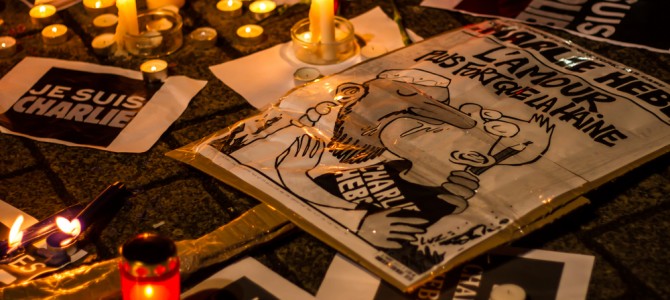A short while after the Islamist terrorist attack in Chattanooga, it came out that the French magazine Charlie Hebdo—its staff members the victim of an Islamist terrorist attack in France—will no longer draw cartoons of Islam’s prophet, Muhammad. “We have drawn Muhammad to defend the principle that one can draw whatever they want,” Laurent Sourisseau, the magazine’s editor, said. “We’ve done our job. We have defended the right to caricature.”
One can understand the impetus: Sourisseau survived the shooting after taking a bullet to the shoulder. When you just barely make it out of a slaughter in which 11 of your friends died, one imagines you’d want to maybe cool off a bit, perhaps avoid the kind of confrontational material that nearly got you killed in the first place. Next time you might not be so lucky; next time they might bring more guys, or more guns, or bombs. Next time.
“We’ve done our job,” Sourisseau says—and he is entirely correct. From the standpoint of free expression and free speech, the cartoonists of Charlie Hebdo are unqualified heroes; a number of them are martyrs to the cause. They have done their jobs, and they have earned a respite, particularly given that the cowardly media abandoned them in the aftermath of the shooting. Who would want to go through the whole thing another time only to once again see the vast majority of newspapers and magazines too fearful and too pathetic to come to your defense?
What Now for Free Speech?
So we should not begrudge Charlie Hebdo its retirement from the fray; the magazine deserves it. What is necessary now is to ask ourselves: how do we move forward? What is the future of Islam and free speech? Islam still has a violence problem. It is still a significant risk to draw Muhammad, made all the more significant because most people will inevitably criticize the artists rather than the murderers who come to kill the artists. Charlie Hebdo has “defended the principle” of freedom of speech, but that principle is still under serious threat around the world: from the murderous gunmen of radical Islam, to the fanatical “hate speech” laws of Western Europe, to a media class that responds to acts of terrorism by asking that we comply with the demands of terrorists.
In the face of these genuine threats to one of the most precious of human freedoms, it might not seem like such a big deal to give up a narrow segment of your free speech: who cares if you can’t draw Muhammad, so long as it keeps the peace? That is obviously what Charlie Hebdo is betting on—but then, that is what the Islamist killers of the Charlie Hebdo staff were betting on, too. They bet smart: they won, and Charlie Hebdo lost.
So it turns out that one of the sharpest critics of radical Islam now shares one of the same goals as the clerics of radical Islam: namely, do not make fun of Islam. This is one way to keep the peace. This peace has no use for freedom of speech, but you will certainly avoid getting slaughtered in your magazine office for drawing a silly cartoon.
When Terrorism Pays Off
That is what everyone is hoping for, anyway, and perhaps it will pay off: perhaps if people stop drawing Muhammad, we’ll have less Islamist terrorism to worry about. Then again, terrorists are never satisfied: once you’ve complied with one of their demands, they inevitably think of ten others. Perhaps next year they’ll ask that people stop critiquing Islam so harshly. The year after, perhaps they’ll ask that we stop criticizing it at all. What’s to stop them? “We have defended the right to caricature,” Sourisseau claims—shortly after announcing that he intends to no longer exercise that right. What’s next?
So perhaps the answer to the question above—“How do we move forward?”—is this: we do not stop. We continue to draw Muhammad, or reprint the drawings of others. We do not give in. We demand that Islam be subject to the same standards as any other religion, and accept the same standards of criticism and mockery that other religions have endured for centuries. We do not give up our right to freedom of speech in order to placate the desires of madmen.
If we are to preserve our precious liberties, in other words, we must first refuse to surrender them. Sourisseau is right: Charlie Hebdo “defended the right to caricature,” and defended it well. Their job is done. Ours is not.









